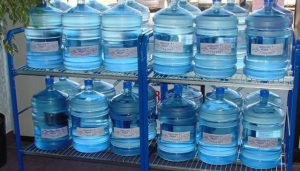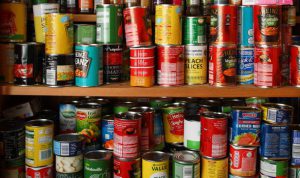
We have experienced firsthand the severity of hurricanes and how they can interrupt access to food, drinking water and electricity for days, if not longer. Now is the time to make sure you have a plentiful supply of drinking water and food so you can provide for yourself and your family.

So how much drinking water and food should you store? Maintain at least a three-day supply of drinking water for each person. A normally active person requires at least one gallon of water daily: two quarts for drinking in addition to food preparation and hygiene. This depends on the weather and an individual’s age and health status. Commercially bottled water is best if available. You should also have a two-week supply of non-perishable food. Don’t forget food and water for your pets.
Click here for a detailed guide from the UF/IFAS Extension Service on safe handling of food and water in a hurricane.
While individual needs vary, here are some helpful tips to put together an emergency food supply:

Nutrition
Include a variety of healthful foods, being mindful of the needs and preferences of babies, children, adults, pregnant woman, and the elderly as well as persons with special health conditions.
Foods should be shelf-stable, easy to prepare and require little water
Examples include ready-to-eat cans and pouches of meat, poultry, fish, fruits, vegetables and legumes; milk (ultra-high temperature pasteurized*) and juice in cartons; dry cereal and crackers; peanut butter and jelly; dried fruit and trail mix; and food bars.
Balancing water and food supplies
Do not ration water. If the drinking water supply is limited avoid foods that are high in fat, protein, or sodium which can increase thirst.
Equipment and utensils
Store a manual can opener, scissors, paper towels and disposable tableware and utensils in your emergency kit.
* Milk processed under ultra-high temperature pasteurization is heated to at least 280° F and packaged in sterile, airtight
containers that do not require refrigeration until opened. It can be safely stored on the shelf for at least six months.
Click here for a comprehensive hurricane preparedness guide from the Federal Emergency Management
Agency (FEMA).

Don’t delay, prepare your emergency drinking water and food supply today!
#Tropical Storm Michael
#Hurricane Michael
 0
0
